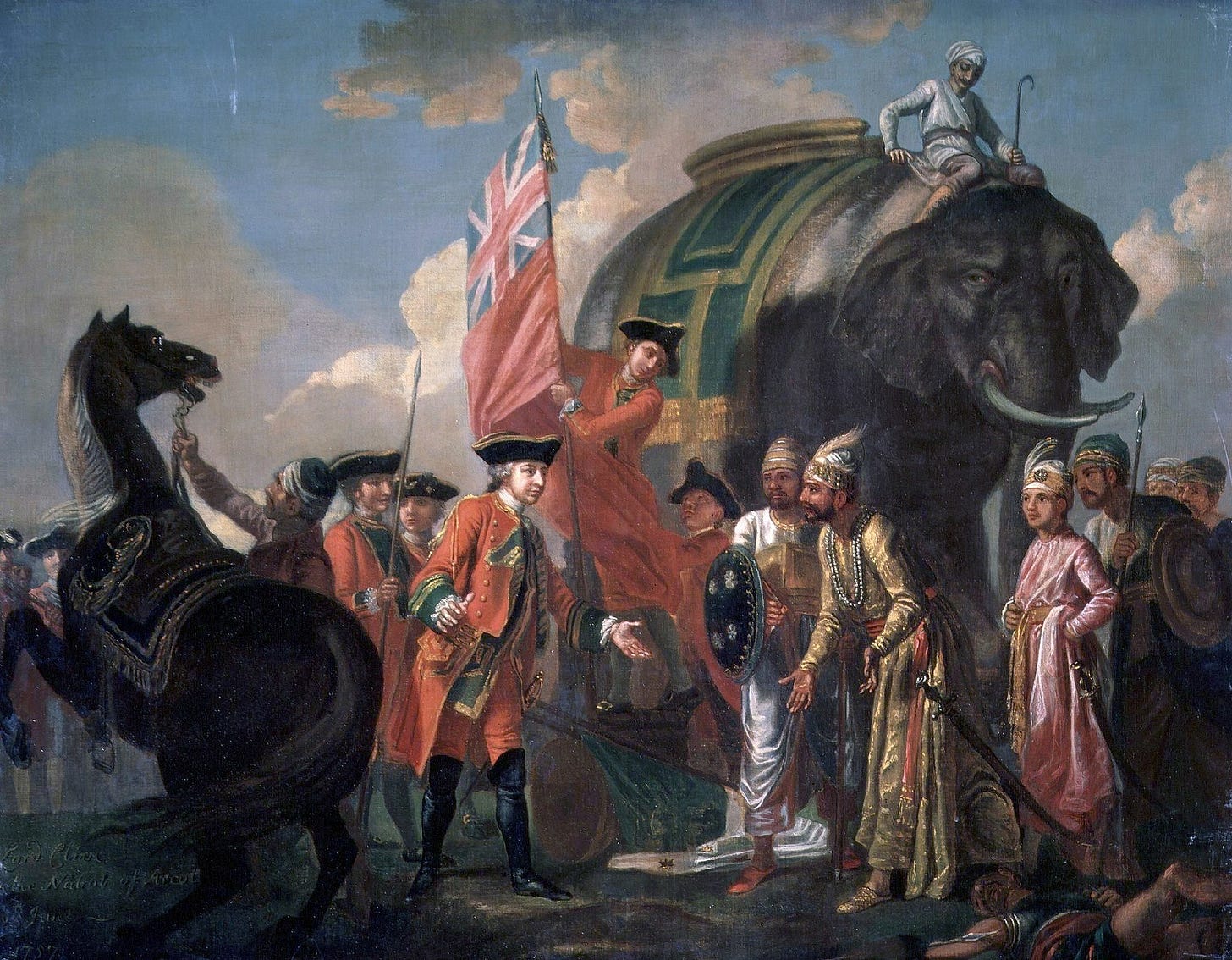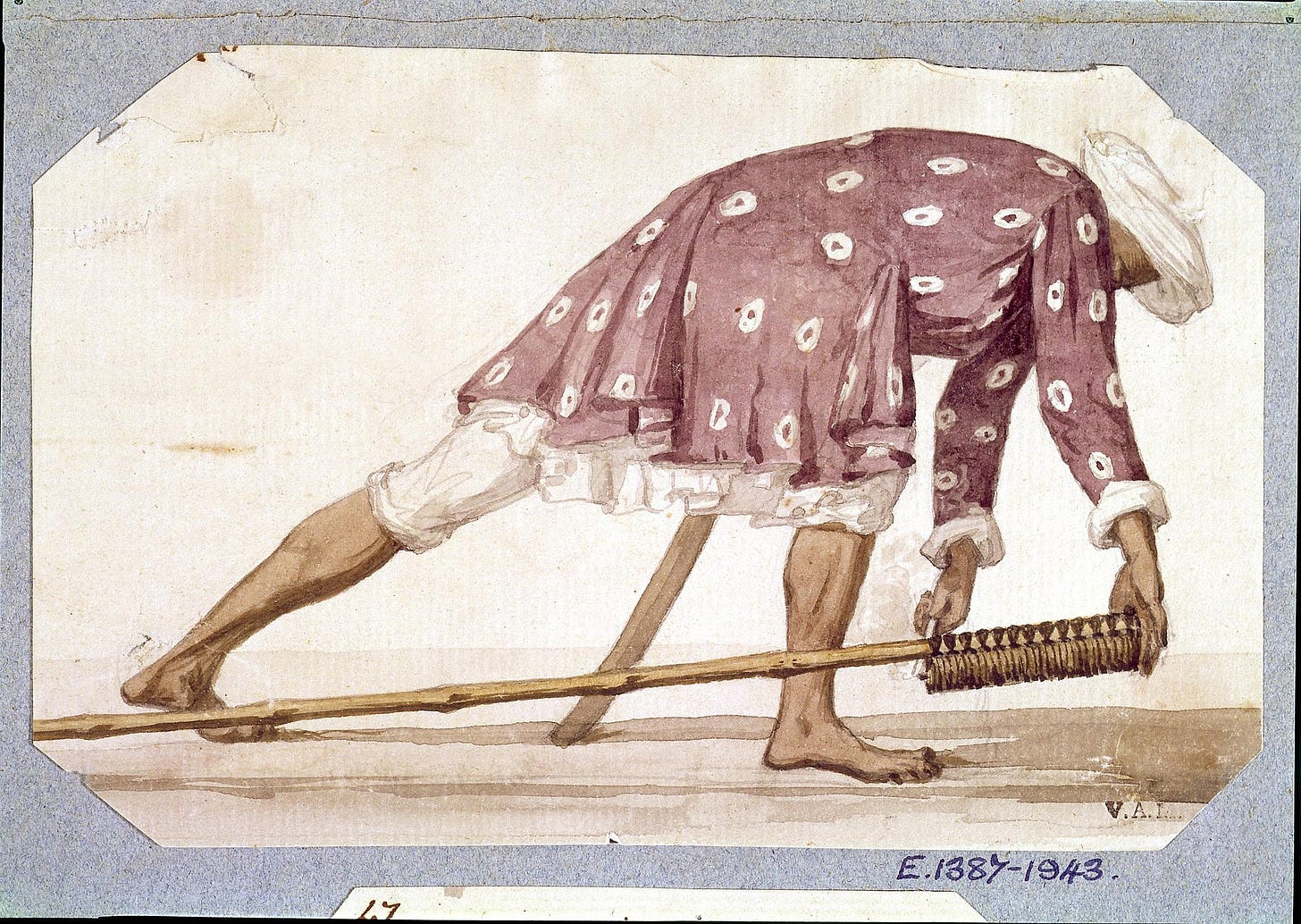When the Looting Starts....
The British Looted Everything from India, including the word for "Loot"
Last week, the US president threatened to unleash the full wrath of state power against "thugs" when he said, "When the looting starts, the shooting starts." He certainly didn’t know that one of the very first Indian words to enter the English language was the Hindi term "lootna," which means "to steal" or "to plunder." The president also coincidentally echoed the way the British used the word "loot." The East India Company (EIC) designated "looting" for the actions of alleged Indian criminals whose theft from the company was minuscule in comparison to its own extensive plunder just as the president and his cronies shamelessly loot at every opportunity.
In 1757, EIC conquered Bengal and installed the traitor Mir Jaffar Ali, the top general of Nawab Siraj who cooperated with mercenary Robert Cliv, as its puppet head. Mir Jaffar Ali then signed the treaty of Aligargh, which granted EIC sovereignty over the Kingdom of Bengal. EIC took over Bengal's mints, and gave itself exclusive authority to coin money. EIC also took over all the existing factories in Bengal as well as the ports, trade routes and highways.
Francis Hayman paints the imagined meeting between Mir Jafar and Robert Clive.
EIC officials replaced Bengal’s tax collectors, in 1764, imposing both a land tax and a tariff on any trade. By 1767, EIC doubled the total land tax in order to meet shareholder demand back in England. The following year, the monsoon season was excessively dry and crops failed. Farmers struggled to cope with severe shortages of grains. Moghuls usually responded by requisitioning grains from other areas of the empire to feed the subjects of the famine-plagued region. However, the EIC didn't bother with such petty problems like ensuring adequate food to the people of Bengal as its only goal was profit. Without food, people in the villages migrated to other areas in search of food, and while traveling from village to village, they inadvertently spread the small pox virus, creating an epidemic in 1770. Within one year, 10 million people in Bengal died, one-third of its population. With vast areas of the countryside decimated, nature reclaimed former farmlands.
Meanwhile, EIC was indifferent to the millions of dead but did become very alarmed by its decreasing profits. To recoup its shareholders investments in India, it required the famished, sickly people of Bengal to pay a 10% increase in land tax.
The first Governor-General of India, Warren Hastings, authorized the tax collectors to use force to collect taxes from the "recalcitrant" areas. The now-emptied villages had fewer resources, but were forced to pay more in taxes to the British authorities, which coincides with reports of increased dacoity. According to a legal memorandum from that time, "[b]odies of freebooters used to enter the areas from the adjoining hilly countries and the jungle- shelters and loot the villages, where a general state of lawlessness prevailed." Some villagers raided each other to procure enough grain to pay their taxes imposed by the EIC, while others, whose communities had been decimated, had to steal to feed themselves.
The British Government because of its gross mismanagement that caused the collapse of the Bengali economy. Because of its increased debt, EIC had to further expand into more areas in India to boost profit for its shareholders.
After annexing the Carnatic Kingdom in the east and bullying the Nizam of Hyderabad into privatizing their dominions for profits, the EIC turned to the last stronghold: The State of Mysore. Mysore held an important area in the middle that would consolidate the EIC's Indian holdings. However, the Mysorean army fought back with rockets that could blow up targets miles away. A young English officer named Bayly observed: "So pestered were we with the rocket boys that there was no moving without danger from the destructive missiles." He continued, “The rockets and musketry from 20,000 of the enemy were incessant. No hail could be thicker. Every illumination of blue lights was accompanied by a shower of rockets, some of which entered the head of the column, passing through to the rear, causing death, wounds, and dreadful lacerations from the long bamboos of twenty or thirty feet, which are invariably attached to them.”
The Kingdom of Mysore proved so elusive that it took them four wars and nearly 40 years to conquer it. Among other challenges, in 1799, during the Siege of Srirangapatnam, EIC found that it didn't have enough rice to feed its soldiers. They arrested 100 thugs on the outskirts of Bangalore to explain away why EIC mercenaries were short on essential supplies. All sense of irony seemed to be lost on the EIC as it scapegoated 100 Indian men for 'looting' British supplies. Meanwhile, in Srirangapatnam, after storming the forts, the British went on a four-day plundering raid.
The EIC's inventory confirms that they took every painting, decoration, and piece of furniture from Tipu Sultan's palace. They even loosened floorboards made of marble and unbolted its beautifully carved wooden doors. They looted the entire library in Srirangapatnam, storming into the bedrooms and the closets. Even Tipu Sultan's silk underwear and shoes were claimed and shipped back to the UK. According to one of the British officers, "there was not a house that wasn't plundered." Ultimately, they stole £2.2 million worth of goods from Sirangapatnam. Accounting for inflation, today the value would be equivalent to £214,700,000.00.
For the British, “looting” was a useful new addition to the English lexicon because they made it the centerpiece of their foreign policy And it is not the only word the English ‘borrowed’ from India. Other words for “stealing” have also been adopted, such as “Dacoit,” a fancy word for robber, which comes from the Bengali “Daku,” which means “robber.” And “thug,” whose origin is the Sanskrit, “Thag,” which means “deceiver.” In the end, regardless of how you label the transference of resources by force, what the British stole from India would add up to over £9.2 trillion.







Thank you for sharing excellent collection of history datas and fine wrighting wish her all the Best